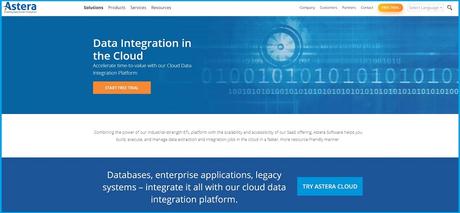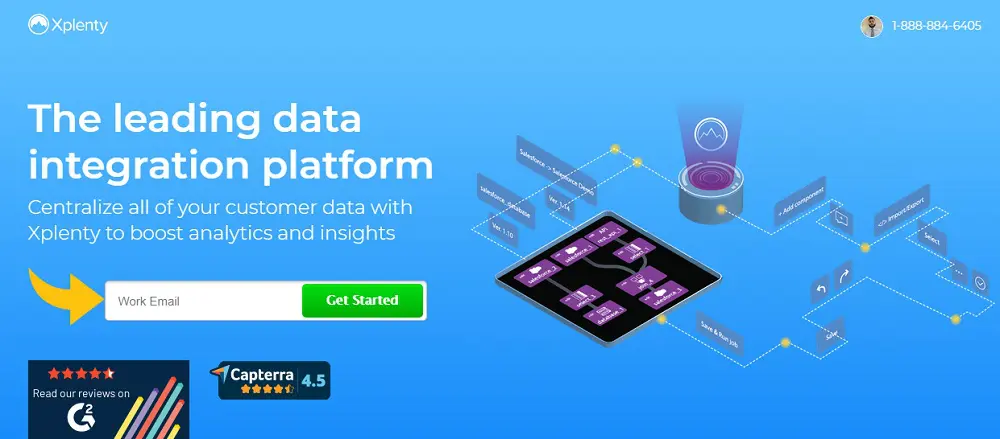Do you want to have easy access to information and make faster decisions while your business operations enjoy increased efficiency, sales, and profit? These top best data mapping tools are the best choices for you.
What is Data Mapping?
Data mapping is the method of equating the source data with the target data. It is also the method of mapping atomic data units from two separate data units. It is often used for data transformation, data warehousing, data migration, and data integration. Data mapping is also a crucial step in the process of data management.

Data mapping tools enable developers to identify mapping rules via coding. Most of these data mapping tools also have a graphical interface to define these mapping rules, making it easier for non-technical individuals to define mapping rules.
Below is a list of the various top best data mapping tools available in the market.
Top 17 Best Data Mapping Tools

This mapping tool offers a solution for deploying, managing and designing Integration and APIs faster. Salesforce enables you to improve deployment and increase scalability. The tool extends connectivity capabilities.

DBConvert is a data mapping tool that offers synchronization software and Database migration to replicate and convert your data between the most common databases such as DB2, MS Access, SQLite, Firebirds, PostgreSQL, Oracle, SQL Server, and MySQL. It carries out data replication between various cloud platforms like Google Cloud SQL, MS Azure SQL, AWS, and RDS/Aurora.

It has never been easy to copy data from your Source Object to Target Object and automatically define the default values for your Target Object. PostObject enables users to define field mappings between two objects and use mapping to automatically populate values from the source object to the target object while generating the target record. PostObject is efficient and flexible and allows users to choose between Field Mapping and Value Mapping options for more flexibility.

Oracle data mapping tool offers cloud-based data integration solutions and enables you to manage APIs. Oracle Data Integrator provides you with continuous and uninterrupted access to data across different systems. It uses API management and machine learning to extract the value from your data.

This data mapping tool functions as an easy-to-use and strong cloud data mapping platform. The tool functions with any size and type of semi-structured and structured data. It allows users to build and manage complicated data integration scenarios effortlessly. It does this through the browser by making use of a drag-and-drop intuitive interface. Also, Etlworks Integrator is a full-blown Enterprise Service Bus that enables users to easily create data integration APIs. This data mapping tool supports specific data integration scenarios. It requires a specialized collection of tools and costs a lot to implement, like HL7 transformations, data synchronization, direct data upload to online data warehouses like Snowflake, and several others.

CloverDX is an open architecture platform that allows you to code data jobs whenever needed. The tool offers a rich collection of pre-built transformation components.
CloverDX is suitable for both basic and complex tasks. It allows you to design reusable data transformation. CloverDX can be linked to external systems via event triggers, file watchers, message queues, and APIs. The tool helps you monitor, manage, and schedule complex workflows. It also helps you handle a variety of jobs.

HVR is a real-time data replication solution designed to efficiently transfer huge amounts of data into hybrid real-time analytics environments. HVR enables you to explore the benefits of using log-based change data capture to replicate common DBMS data such as Teradata, Azure, AWS, SAP Hana, Oracle, SQL Server, etc.

Alooma is a data mapping tool that enables you to reproduce the data to the output of your choice. The tool supports Periscope Data, Snowflake, Google BigQuery, Amazon Redshift, etc. Alooma also supports a variety of data sources.

This data mapping offers an efficient, affordable, high-performance, and scalable integration framework. It is built so as your business information specialists can easily use it. Thought easily built, it is flexible enough to solve even the hardest and most challenging data integration issues. This data mapping tool involves data transformation, data profiling, and data quality in a robust environment that allows you to easily choose from several integration scenarios.

Xplenty is a data mapping tool and also an ELT, ETL, and cloud-based data integration tool. Xplenty allows you to build quick, visualized data pipelines to your data warehouse. It also enables you to integrate data from over 100 data stores and SaaS applications. Xplenty can combine data from several sources, such as cloud storage services, databases, NoSQL, and SQL data stores.
The tool incorporates all marketing sources such as analytics, CRM data, social media, etc., and can provide updated, accessible, and reliable marketing information. Xplenty's intuitive graphical interface can help you incorporate ETL, ELT, or a replication solution. With the support of its workflow engine, you can orchestrate and schedule data pipelines. It provides connectors for data warehouses, files, databases, applications, etc.

Talend is a data mapping tool that provides robust data integration in an open and scalable platform to optimize business value. The Talend Data Integration offers centralized tools for integrating, cleansing, masking, and profiling all your data, allowing you to transform data into decisions.

This data mapping tool helps integrates experience management and data management in a one digital system. The tool provides Digital Commerce Platform (eCommerce), Web Content Management (WCM), Master Data management (MDM), and Product Information Management (PIM) in one suite.
Pimcore's unified framework allows companies to handle online content, digital commerce, digital assets, and product information in a well structured environment. It also provides one perspective of information for companies and presents their customers with a excellent product experience through various touchpoints.
This data mapping tool is a perfect alternative to the costly digital system because of its momentum of more than hundred global solution partners, speed-to-market, API-driven approach, and unparalleled versatility. The framework of this tool is based on an open architecture. The tool has no license cost for businesses, agencies, and developers. Established in 2009, It has its headquarters in Salzburg, Austria, with additional offices in Sugarland, Texas, and New Delhi, India.

Pentaho allows users to prepare, cleanse, and blend a variety of data from any source. Pentaho uses visual tools to eliminate complexity and coding and puts the highest quality data at the fingertips of IT and business.
With this data mapping tool, you'll be able to move seamlessly between execution engines such as Apache Spark. Pentaho offers robust support for object stores, NoSQL, Spark, and Hadoop distributions.

This data mapping tool is an integration, conversion, and graphical data mapping tool that maps data between web services, JSON, Excel, flat file, XBRL, EDI, XML databases. It then transforms data instantly or creates source code or execution files for recurring conversions.
Altova carries out any-to-any mapping for data types such as Google Protocol Buffers, Excel, REST and SOAP Web services, EDI, XBRL, Text and flat files, Database data, JSON, and XML. The tool offers a graphical interface for manipulating, visualizing, mapping and executing complex and individual mapping projects. Altova has extensible data processing and conversion library. This enables you to import the existing data transformation code.

Informatica PowerCenter lets you unlock the value of your data. This data mapping tool provides a unique end-to-end data integration platform with a wide range of capabilities to incorporate raw, fragmented data from multiple sources, transforming it into full, high-quality, business-ready information. As the world evolves, PowerCenter scales to meet your rising business needs, data volumes, and complexity while offering insight into business and IT.

This tool is a leading ETL tool that incorporates data through several business systems. It leverages a high-performance parallel framework, available in the cloud or on-premise. IBM InfoSphere DataStage offers enhanced metadata management and business connectivity. The tool incorporates heterogeneous data, including big data in motion (stream-based) or large data at rest (Hadoop-based) on both mainframe and distributed platforms. IBM InfoSphere DataStage supports both IBM Db2 Z and Db2 for z/OS. It also applies business rules/workload and incorporates real-time data into an easy-to-use, scalable platform.
IBM InfoSphere integrates big data with enterprise data. It has the potential to deliver data in real-time. The tool uses secure data migration methods.

To develop and succeed in a fast-paced digital age, you need an agile technology foundation that accelerates the flow of information, interactions, and innovations so that you can achieve better business results more quickly. Dell Boomi's scalable, flexible, and intelligent platform quickly and easily integrate everything and everyone in your digital environment across platforms, devices, and channels. Its advanced features combined with an intuitive interface, built-in intelligence, and insights from the Boomi community enable business and IT users to do more in less time so that you can say yes to whatever your business needs to thrive. Dell Boomi is your smarter, faster, and simpler path to better business outcomes.
Conclusion
We have been able to examine the various top best data mapping tools. These tools have their area of specialty. For example, Altova is great for Graphical Interface of mapping data; Informatica is good for Power Center tools; Talend is excellent as a data integration tool; Pentaho offers the best drag-and-drop features. CloverDX is great for its flexibility feature.
Alooma is good for importing data from any source; Oracle is nice for data transformation; Adeptia is good for its flexibility features; IBM is good for metadata, and finally, Salesforce is good for integration with other systems.

